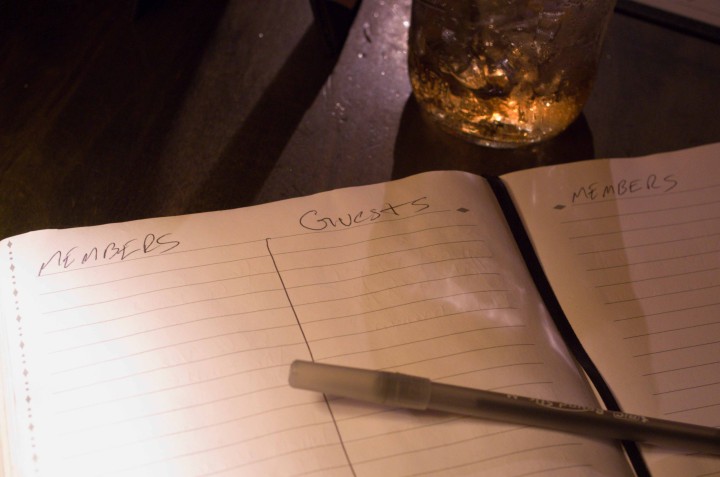It’s the same old drill at every bar in Asheville that doesn’t serve food. Stop at the door to show proof of age and then either fumble through your wallet to find your membership card or fill out a form and pay a fee. Why? Because in North Carolina, you’re not walking into a bar; it’s a private club.
“North Carolina doesn’t allow bars,” says the Asheville Alcoholic Beverage Control board’s general manager, Mark Combs. “If you go to Pennsylvania, you can go to a bar. They have some chips or peanuts maybe, but it is just a bar. In North Carolina, though, you have to have a percentage of food and alcohol.”
Under state law, public establishments such as restaurants can serve liquor by the drink only if their food sales exceed 30 percent of total receipts, a figure that the ABC meticulously audits. (Hotels may serve if there is a restaurant nearby and lodging receipts are greater than those of alcohol.) If those standards are not met, or if a venue does not serve food at all, then the business is required to be a members-only club, with patrons paying club dues and having to carry their membership cards with them when visiting. Breweries that operate tasting rooms are allowed to do so without serving food under the ABC’s on-premises malt beverage permit.
Stacy Cox, chief special agent in charge of N.C. Alcohol Law Enforcement’s Western Division, says that at this time, “there are 246 active mixed beverage permits in Buncombe County. An additional 19 are now in temporary status, she adds, meaning those businesses have been granted 90-day permits pending background and premises checks by an ABC investigator.
“It’s not that I have any issue obeying the rule, I just don’t understand why it’s there” says Celeste Adams of Burger Bar, a beer and shot joint that has been around for nearly 70 years. “It happens every single time someone walks in the door. ‘Do you have a membership?’ ‘Would you like to buy a membership?’ Or ‘do you have your membership card?’ And then people don’t have their membership cards on them, and they have to fill out the whole form again and pay for a new card. Or they have 35 different memberships in their wallet, their wallet is huge and they don’t want to carry it. I just don’t necessarily know what the point is anymore.”
Cate and Chad Battles, owners of The Bywater, say the law is also a hardship on business owners. Although The Bywater operates as a lifetime membership club, Cate Battles says they currently have more than 20,000 membership applications on file, all of which must be directly accessible for ABC review any time the bar is open. Battles enters all the applicants into a computer spreadsheet, which staff members can access on iPads and iPods behind the bar and at the door.

The bar is also required to make all of its old and current sign-in books available to the ABC at all times, which creates a significant storage dilemma. “We ran out of room at our tiny bar,” says Battles, who adds that she and her husband have had to resort to storing old membership materials at their home.
North Carolina law defines a a private club as “an establishment that is organized and operated solely for a social, recreational, patriotic or fraternal purpose and that is not open to the general public, but is open only to the members of the organization and their bona fide guests.”
“They only allow private clubs or restaurants because bars are just meant to drink,” says Al Bottego, the Asheville ABC board’s chief of law enforcement. “It is their only purpose. The No. 1 problem statewide is overconsumption, and it’s always been the big fear, and it’s why the bar thing has never been allowed. Private clubs are the only version you would have of a bar, that’s as close as you’ll get. As far as having a neighborhood bar where people just come in for a drink, it wont happen. Because, again, think of today’s culture: You leave work, you come down to the bar and put down a couple or three mixed drinks before you go home. It creates the environment for DWIs.”
“I think it’s ridiculous.” says Ken Klehm, who founded several of Asheville’s first craft cocktail establishments and is regarded by many as one of the fathers of the city’s cocktail scene. “Why can’t they just be a bar? I mean, it costs us more money making thousands of cards every year. It discourages business, costs us business. I can’t say that it helped us in any way.”
Klehm once owned and operated the Rocket Club, a concert hall in West Asheville where the restaurant WALK sits now. At the time, the law mandated a three-day waiting period before new members could enter the club. On concert nights, Klehm had to turn away ticket holders who weren’t already members — costing him business and return traffic. That law has since been changed to allow for same-day entrance, but not before the Rocket Club closed.
But that legal makeover leaves club owners and patrons asking, if anyone can get a membership and enter the club that same day, is the law actually fulfilling its intended purpose? Is it actually preventing anyone from drinking and driving? Is it regulating the amount of people just stopping in for a drink? Or is it just an ineffective hassle for these businesses?
“The revision in rules in my opinion is a direct response to the change in times and commission being progressive to the need for change,” says Bottego, “The change in membership time [in my opinion] allows the new member to take advantage of the social setting sooner, but again the structure for [a] private club is much more than just a place to drink.”




I think the law is a good idea BUT it dies need some revisions and make overs… Why not make the bars themselves have the memberships and leave the restaurants to make their businesses more successful without the hassle of having to fill out a membership form every time you want to try new food or a new place? IMO if NC would allow bars (places strictly for drinking) and place the regulations they have on the “private clubs”(including the 3 day wait period) they would still be preventing the possible DWIs without troubling the small business owner who depends on sales to make it work… Ppl are gonna ask if I’m a business owner, no I’m not, but that doesn’t mean I can’t have a mind for business and what it would take to run one, it can’t be easy and a lot depends on sales… No sales no profit, with no profit there’s no business, without them in Asheville what are ppl supposed to do? Get drunk at home and then risk a drive to the ABC store? That would just create more problems than its worth with the DWIs… But anyways like I said before thus is just my opinion, like they always an opinion is like a butthole, everyone’s got one :-p
Sorry for any typos or missing words in my post… I’m half asleep from a third shift job that seems to never end for me…
This law is antiquated, completely irrelevant and serves literally no purpose other than to line the bureaucrats pockets. Same thing w/ABC and the disgusting ALE, they exist only to generate income, nothing more. They serve and protect exactly nobody or nothing except their own interests. They’re cracking down on the industry that feeds them, the industry that feeds WNC as a whole and has brought us lots of jobs, money, tourists and accolades. It’s time for someone with some money and time to sue the state and get rid of these antiquated, useless policies and get rid of the ridiculous organization called the ALE. Their own agents don’t even know the liquor laws correctly or why their enforcing them, they are a huge joke and everyone knows it.
I work at a private club and there is no three day wait anymore. It went out the window a few years back. I also work part time at a restaurant. No membership needed there. Never had a problem with ALE either. They actually helped us once when some guys started fighting.
It’s dumb. You can become a member by writing down your name and address. How does that prevent me from leaving drunk? It doesn’t. What would work is 1-low cost loans to small bars to build a kitchen or get an existing kitchen up to code. Having a full stomach means if you get drunk, it’ll happen much more slowly. 2- Providing a free ride service to people who get drunk and need a ride. Many large cities do this. It might be harder to do in small towns.
I actually am a fan of the way this law is, mostly because it really doesn’t do anything. NH liquor laws are very similar to NC but there is no private bar clause. which means we HAVE to have a kitchen. which is a pricey expense, that does not guarantee that people will even eat. And we have to sell 75K in food or 50% food. It’s quite funny, in the liquor laws classes run by the state, they teach you that food, coffee, water cannot sober you up, only time can, yet have laws requiring FOOD sales.
I will gladly take the having to keep a ledger in an office over building a 150K dollar kitchen